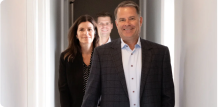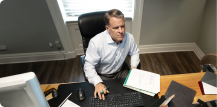/
Admin
Yesterday, my five year old son Johnny learned to ride a bike. It was late in the evening and close to getting dark, but we had been talking about an attempt "sans" training wheels all day and so I said okay. Removing the training wheels, I took his bike to the back yard where the grass was soft and asked him to get on. I held the backseat of the bike a couple of times and ran alongside him, but it didn't seem to work too well as he was always leaning against me, his substitute for training wheels.
So, on the third attempt, I do what many parents of their younger children do. I got him going, gave him a good shove and let go. And you know what? He kept on going! Sure, he eventually fell, but all in all he became a bona fide bike rider in very short order. The outcome was an unexpected joy to behold. Wow, how easy!
My older daughter also learned to ride a bike this year. She had never gotten past the training wheel stage largely due to lack of interest, a little fear, and very little in the way of personal incentives. That quickly changed about a month ago when a good friend asked her to go biking, but she knew she wasn't capable. In similar fashion to Johnny, Molly learned to ride in extremely short order. It just took incentives, personal ones.
Like many, I often wonder what's the worst thing that would have happened had the government refused to be the economy's training wheels for the past twelve months and for some industries, perhaps decades. How do both behavior and incentives change when dad's hand is always there? I know it isn't a perfect analogy to learning to ride, but last night, I was really thinking about it.
The market continues to move upward today. Wells Fargo, in particular, is up 17% and strengthened even after rumors surfaced at noon, indicating that they would have to raise additional capital on poor stress test results.
When you ride a bike on your own for a little while, you build the necessary confidence to ride it further. If the Wells news is true and the reaction in the stock price legitimate, then it's as good a sign as any that being bearish may no longer pay. The market may be past worst case scenarios.
Let's ride!
So, on the third attempt, I do what many parents of their younger children do. I got him going, gave him a good shove and let go. And you know what? He kept on going! Sure, he eventually fell, but all in all he became a bona fide bike rider in very short order. The outcome was an unexpected joy to behold. Wow, how easy!
My older daughter also learned to ride a bike this year. She had never gotten past the training wheel stage largely due to lack of interest, a little fear, and very little in the way of personal incentives. That quickly changed about a month ago when a good friend asked her to go biking, but she knew she wasn't capable. In similar fashion to Johnny, Molly learned to ride in extremely short order. It just took incentives, personal ones.
Like many, I often wonder what's the worst thing that would have happened had the government refused to be the economy's training wheels for the past twelve months and for some industries, perhaps decades. How do both behavior and incentives change when dad's hand is always there? I know it isn't a perfect analogy to learning to ride, but last night, I was really thinking about it.
The market continues to move upward today. Wells Fargo, in particular, is up 17% and strengthened even after rumors surfaced at noon, indicating that they would have to raise additional capital on poor stress test results.
When you ride a bike on your own for a little while, you build the necessary confidence to ride it further. If the Wells news is true and the reaction in the stock price legitimate, then it's as good a sign as any that being bearish may no longer pay. The market may be past worst case scenarios.
Let's ride!



